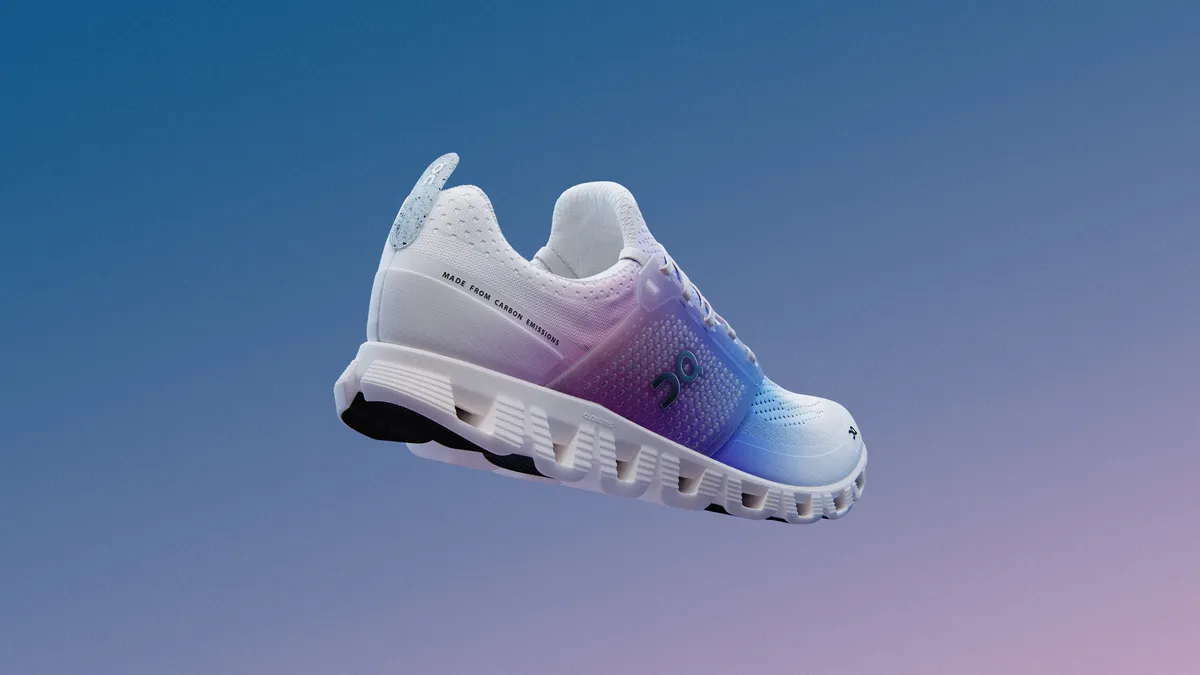Dive Brief:
- Introducing an innovation to the footwear industry, Swiss company On says it has created the first shoe using carbon emissions as a raw material in its foam, according to a press release shared with Retail Dive.
- The Cloudprime shoe — which uses CleanCloud EVA foam in the midsole — was made in partnership with LanzaTech, Borealis and Technip Energies to create a “supply chain coalition,” per the release.
- Approximately 70% of the shoe is CO2 based and it is in the prototype stages with the goal of bringing it to consumers within the next three to five years, a company spokesperson said.
Dive Insight:
On is one step closer to its goal of all products being fossil fuel free and circular.
“Holding the first-ever shoe made of carbon emissions in my hands is a huge milestone – not only for On, but for the whole sports industry”, Caspar Coppetti, co-founder and executive co-chairman of On, said in a statement. “Five years ago, this was barely a dream. Imagine what can happen in the future as we unlock the potential of alternative carbon sources with further research and in collaboration with the best partners.”
LanzaTech uses its carbon capture technology on emissions from industrial sources prior to it being released into the environment. A fermentation process is then used to turn that into ethanol, which is then dehydrated into ethylene by Technip Energies. Borealis then turns the ethylene into ethylene vinyl acetate, which is used by On to make the foam of Cloudprime.
On didn’t stop at the midsole though. The outsole of Cloudprime is made in collaboration with Novoloop using what it calls the world’s first upcycled thermoplastic polyurethane from post-consumer plastic waste, per the release.
The brand’s next hurdle is bringing this type of shoe to scale through further investment in CleanCloud. Carbon capture technology is thought to consume more energy and become more costly the more efficient it becomes.
“The closer a [carbon capture and storage] system gets to 100 percent efficiency, the harder and more expensive it becomes to capture additional carbon dioxide. From an engineering perspective, it is easier to capture carbon from a gas with a higher concentration of CO2 because more molecules of carbon dioxide are flowing past the scrubbers,” said a blog post by Andrew Moseman featuring MIT Senior Research Engineer Howard Herzog. “Grabbing even more CO2 once most of it is gone requires larger equipment, more time, more energy, and a bigger investment.”
Many other brands have been looking into material and production process innovation in order to create a more sustainable industry. Nike unveiled a new production process and material last week called Forward, which has a 75% lower carbon footprint compared to standard knit fleece. Basic brand Fruit of the Loom recently launched a collaboration with recycling technology company Recover, which features limited-edition T-shirts made of 20% recycled cotton fiber.















